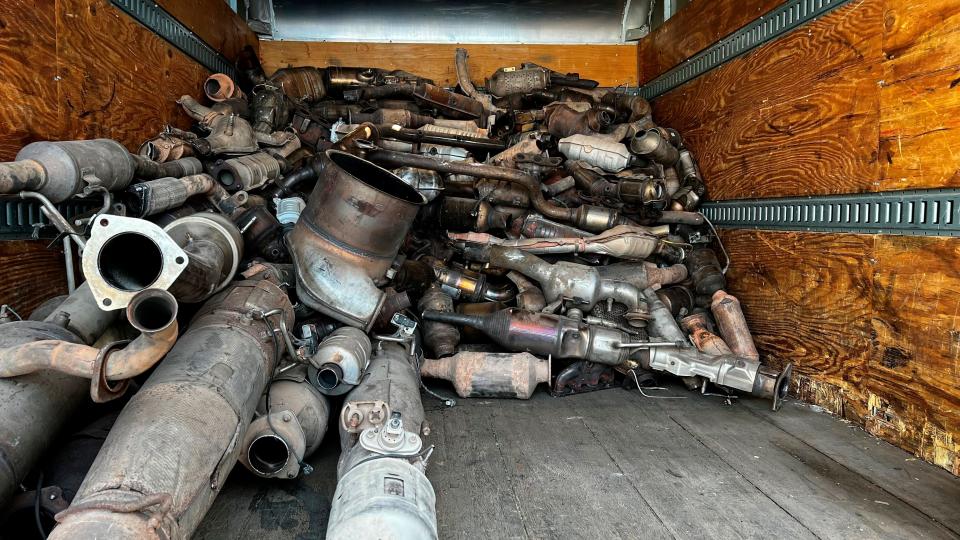Fact check: Expert warns against 'gullibility check' scam posts alleging catalytic converter theft
The claim: Image shows a man stealing catalytic converters in various cities
The valuable metals in catalytic converters make them a ripe target for theft, but some social media users are claiming the same man is stealing them in countless cities across the country.
“Let's Make this dude famous he's cutting catalytic converters in San Antonio (sic),” reads a Sept. 20 Facebook post that has been shared more than 4,000 times. The post includes two photos of a man wearing black clothes and a black hat while holding a saw.
The same images and caption were used in an array of social media posts in the following weeks, each claiming the man was targeting a different area somewhere in the U.S.
Follow us on Facebook! Like our page to get updates throughout the day on our latest debunks
But the picture in the post has appeared online for several years, first surfacing in reference to a series of catalytic converter thefts in the United Kingdom in 2020. An expert told USA TODAY these copy-and-paste tactics are used by scammers to identify credulous people to target for future scams.
USA TODAY reached out to users sharing the claims for comment.
Image surfaced in UK in 2020
The picture is presented as recent and originating in a wide array of U.S. cities, but the picture isn't from any of those places.
Stolen Vehicles Recovery UK, a Facebook page that tracks vehicle thefts in the U.K., included the image in an August 2020 post warning users about a group of people stealing catalytic converters in Oldham, England.

According to the post’s edit history, it was updated on Sept. 23 to note that the “photos are being shared in the USA relating to a ‘scam.’”
More: The 10 vehicles most likely targeted for catalytic converter theft, and what cops are doing about it
Louisiana radio station 99.9 KTDY also reported the claim was false. A similar version of the claim, which used photos of a different man supposedly stealing catalytic converters in various cities, was debunked by Lead Stories.
USA TODAY reached out to the San Antonio Police Department, but Sgt. Washington Moscoso said the agency couldn't address the post without more identifying information.
Copy-and-paste posts are 'gullibility check' for scammers
Jeffrey Blevins, a professor of journalism and public and international affairs at the University of Cincinnati, said there are several red flags indicating scammers are behind the widely-circulating posts.
The fact that the same caption and images are being used in claims spanning the country is among them. Additionally, many of the users who created the posts have profiles that list their locations as outside of the U.S.
Blevins, a misinformation expert, said not having the comments enabled is perhaps the biggest warning sign. If there were a legitimate public safety concern, that's where people could share tips in an effort to find a suspect.
Disabling this feature means people creating the posts can't be called out for false information, Blevins said. It also means the only way to interact with the post is to "like" or share it, which increases its spread and helps scammers find potential targets.
“It’s a gullibility check,” Blevins said. “They’re likely to circle back to you later to see what you’re willing to share, or they might try to engage you one-on-one, get you to accept a friend request, that kind of thing.”
More: Hurricane Ian charity scams are out of control. Here's what to know.
Blevins said scammers have gotten more sophisticated over the years. They may include biographical information in their profiles or have photos of real people and pets, which can make their false posts seem more authentic.
They may also create false posts after a similar, widely-documented event to make them more believable. For example, Blevins said people may be more likely to share claims of a catalytic converter thief in Texas after seeing news reports in Dallas of a would-be thief being chased away by his victim.
Fact check: Various reports of missing girl are hoaxes, mislead communities
He also encouraged people to vet posts by cross-checking them with another source. In the case of a purported catalytic converter thief, a search through local news websites would likely reveal if there have been reports of any such thefts in the area.
Ultimately, the more shares a scammer gets on their false posts, the more incentivized they are to continue creating them, explained Blevins.
“It’s really like you’re playing Whack-A-Mole,” Blevins said. “You catch one, you smack it down, and it pops up in some other form someplace else right away.”
Our rating: False
Based on our research, we rate FALSE the claim that an image shows a man stealing catalytic converters in various cities across the U.S. There is no evidence linking this image to crimes in the U.S. The image first appeared on a U.K.-based Facebook page after a series of catalytic converter thefts there in 2020. An expert told USA TODAY these copy-and-paste tactics are used by scammers to identify credulous people to target for future scams.
Our fact-check sources:
Jeffrey Blevins, Oct. 14, Phone interview with USA TODAY
Lead Stories, Oct. 11, Fact Check: Man Was NOT Cutting Catalytic Converters In Multiple Cities -- The Post Is Ruse To Trick People To Share
KTDY, Sept. 22, Photo of ‘Catalytic Converter Thief’ is Fake, Scam
Stolen Vehicles Recovery UK, Aug. 13, 2020, Facebook post
Washington Moscoso, Oct. 26, Email exchange with USA TODAY
Thank you for supporting our journalism. You can subscribe to our print edition, ad-free app or electronic newspaper replica here.
Our fact-check work is supported in part by a grant from Facebook.
This article originally appeared on USA TODAY: Fact check: Scam posts allege string of catalytic converter thefts

